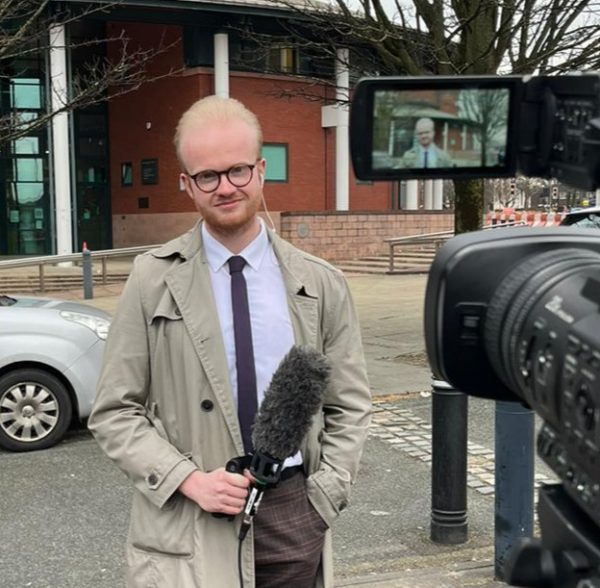
How community reporters are showcasing local struggles as they cover the cost-of-living crisis
Community reporters have been exploring the local impact of the cost-of-living crisis as they speak with residents, business owners, food bank operators and schools.
As the dramatic rise in inflation grips the UK, community reporters have been investigating how the rising costs have been affecting their readers.
The reporters have been hired as part of the Community News Project (CNP), a ground-breaking partnership between the NCTJ, Meta (formerly Facebook) and regional publishers. It aims to support quality local journalism and improve the diversity of UK newsrooms.

Tom Bedworth, community news reporter for the Warrington Guardian
Tom Bedworth, community news reporter for the Warrington Guardian, sent a Freedom of Information request to the local council about energy costs at state-maintained schools.
After analysing the data he received, he discovered that one school in the region was facing paying £50,000 a year extra in electricity bills.
The 22-year-old said: “I wanted to look into the rising costs at schools under local authority control because the council gets funded by the tax payer. Everybody knows about personal bills going up but what about the places they are sending their kids?
“The story combined education and cost of living, which is what people are really concerned about.

“People were really shocked. They were understanding that schools were having to pay for that out of their own pocket so spending less on pupils. It really resonated with people.”
Kimberley Hackett, community news reporter at the Watford Observer, visited a row of shops and interviewed business owners about how they were being affected by the cost-of-living crisis.

Kimberley Hackett, community news reporter for the Watford Observer
She discovered that some shops were struggling for business, with one shop owner not giving himself a salary for the past two months.
Kimberley, 32, who lives in Watford, said: “There was a row of shops that had hairdressers, cafes and shops, and they were quite happy to talk to me and highlight the issues they were facing. They weren’t angry with customers, they understood things were difficult.”
Community reporter Michael Eden, who works at the Hereford Times and was a former press photographer before joining the Community News Project, decided to call local takeaways to discover how the shortage of sunflower oil was affecting their prices.

Michael Eden, community news reporter for the Hereford Times
The 39-year-old, who lives in Hereford, said: “With the war going on in Ukraine, I knew that there was a shortage of sunflower oil. I thought somewhere like a fish and chip shop would be quite heavily affected. They talked to me about how extortionate their costs were.
“I have also been speaking to local food banks and they have been talking about how usages have trebled in a year in the town and it is getting worse all the time. I have been talking to people about the stigma of going to local food banks and trying to eradicate that.”

Anna Ferguson, community news reporter for TeessideLive, has been reporting on how the cost-of-living crisis has impacted food banks across Middlesbrough.
One story centred around how a charity is having to cut items from its emergency food boxes because the budget is stretched, and another focused on free meals and activities available for children during the summer holidays.

Anna said: “There has been an extra focus on food banks as a high majority of people are struggling in the current climate. Those who were already using food banks are being faced with rising costs.
“And now, even those in full-time work, who weren’t necessarily struggling before, are turning to food banks. They are sadly being faced with the devastating decision of whether to buy food or pay their rising utility and fuel costs.
“Reactions from readers have ranged from disgust to delight. The public are disgusted that people are having to make such difficult decisions but they are also really proud that people in their hometown are doing all they can to help each other out.”
Community reporters have also used their role to provide advice and support for local residents, signposting them to local free services.
Phoebe Cox, community news reporter for the Mansfield Chad, has reported on free events in her community, which has been welcomed by residents.
She said: “I am from an ex-mining area and see first-hand the impact that the rising cost of living is having in our communities. If I can alleviate that struggle in some way, by simply sharing these stories, then I am more than happy to continue doing so.
“Through this job, I have been able to platform community projects, write about local creatives, share about free and accessible events happening in the area, and use this platform to offer support and solidarity to the community. I am very grateful for this opportunity.”
Community news reporter Morgan Carmichael, who works for the Glasgow Times, has been able to promote the services aimed at helping struggling families, including a Glasgow charity giving free back-to-school haircuts.

Morgan said: “It’s been great to see readers of my articles interacting with my work, such as sharing it, commenting, tagging people they know in it, and using the post to send their own ‘well-done’s’ to those in the community doing good.
“I’ve also had lovely, encouraging comments from people whose stories I’ve covered who have told me that the article helped them get more interest, traffic and interactions with their work as a result.”
Chloe Nightingale, who works for the Wirral Globe, asked readers to share their advice on how to keep rising energy bills down. She said: “As a community reporter it is important to let other people’s voices be heard, so reaching out on Facebook was crucial for me to find out people’s opinions and thoughts on certain topics and issues.
“People responded very well to my post in the community groups I’m in. I uploaded a Canva picture with the question ‘What are your top tips for keeping energy bills down?’ and it had a great response – over 60 comments overall.”
Will Gore, head of partnerships and projects at the NCTJ, said: “The Community News Project was devised to ensure under-served communities felt more fully represented by, and more connected with, their local news providers.
“At a time when the economic climate is so challenging for both businesses and individuals, it is especially vital that communities have a close relationship with their local newspapers and news websites – not only so that their problems receive the coverage they deserve, but also so that journalism can signpost potential solutions.
“The work highlighted here is a testament to the personal determination of community reporters to serve their audiences, and is further evidence of the positive, ongoing impact of the Community News Project.”

